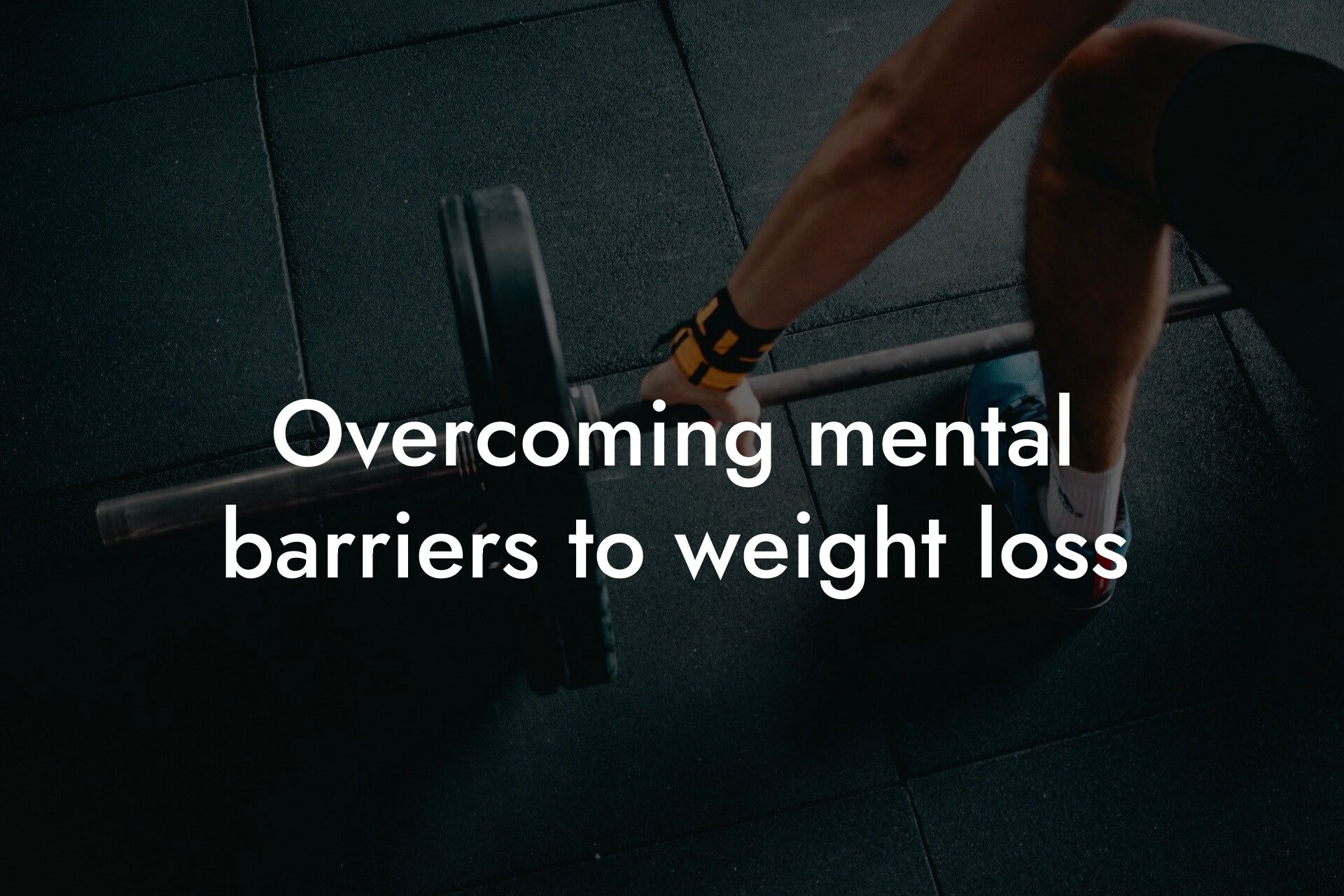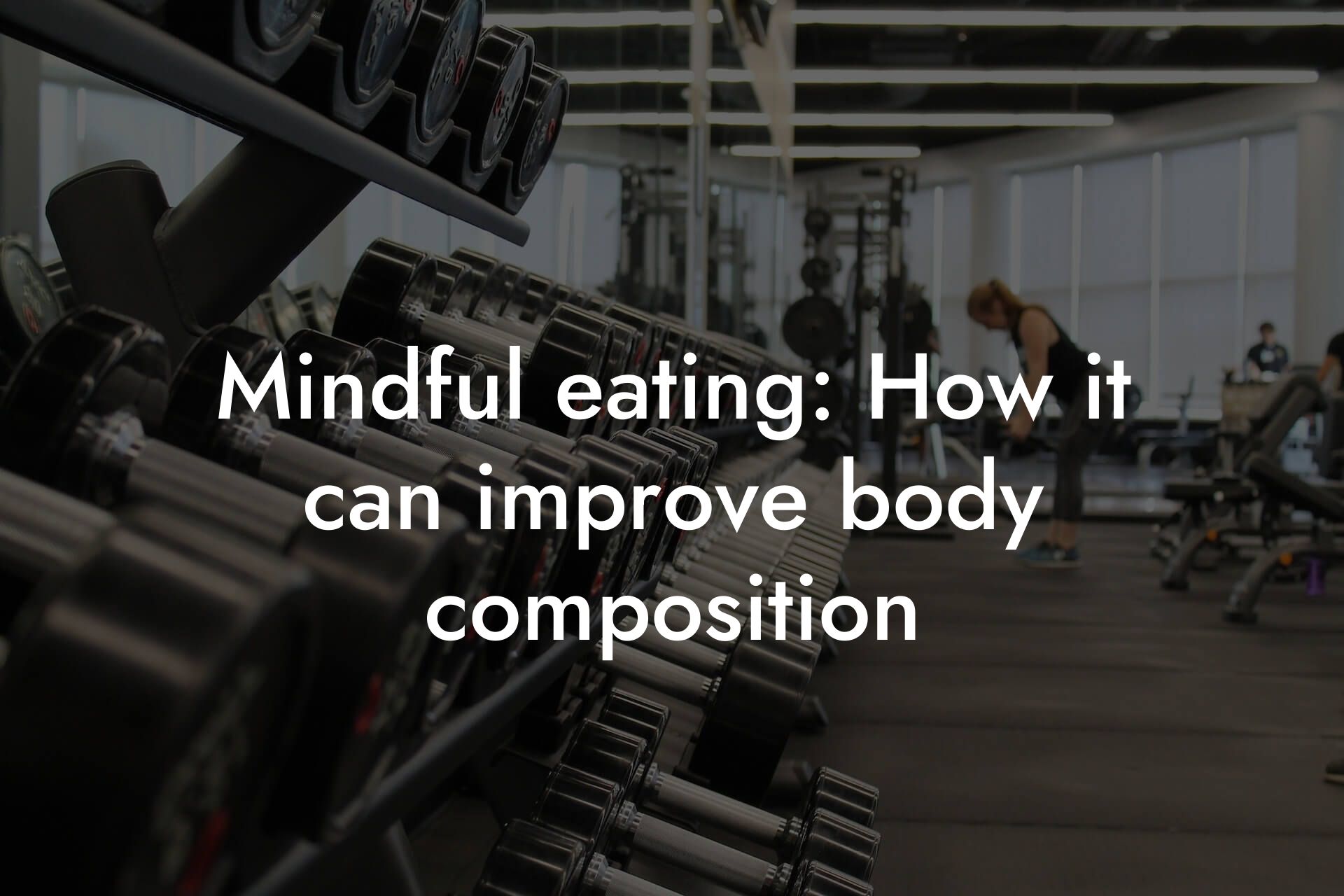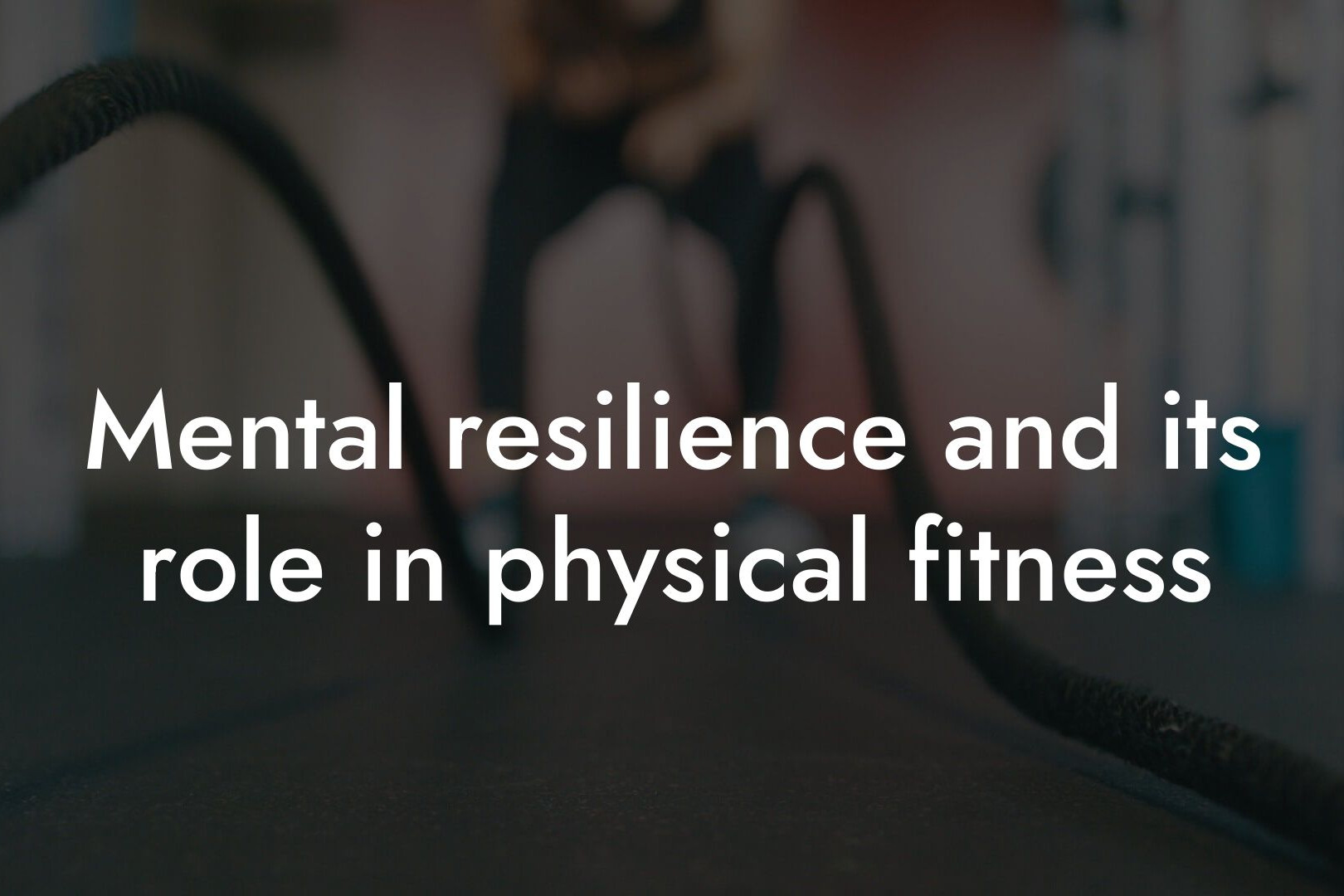As high-earning professionals, you understand the importance of maintaining a healthy and fit physique. However, stress can be a significant obstacle in achieving your body composition goals. Chronic stress can lead to weight gain, increased body fat, and a decline in overall physical health. In this article, we will explore the ways in which stress management can improve body composition, and provide you with the knowledge and tools you need to take control of your physical health.
Table of Contents
- The Science Behind Stress and Body Composition
- The Impact of Stress on Metabolism
- The Role of Cortisol in Body Composition
- The Benefits of Stress Management for Body Composition
- Effective Stress Management Techniques for Body Composition
- Measuring Body Composition with DEXA Scanning
- Frequently Asked Questions
The Science Behind Stress and Body Composition
When we experience stress, our bodies release hormones such as cortisol and adrenaline. These hormones trigger a "fight or flight" response, preparing our bodies to respond to the perceived threat. While this response was essential for our ancestors, it can have negative consequences in modern times. Chronically elevated cortisol levels can lead to increased fat storage, particularly in the abdominal area. This can result in a range of negative health consequences, including insulin resistance, metabolic syndrome, and cardiovascular disease.
In addition to cortisol, stress can also disrupt the balance of other hormones that regulate body composition. For example, stress can lower levels of testosterone, a hormone that plays a critical role in muscle growth and maintenance. This can lead to a decrease in muscle mass, making it more challenging to achieve a lean and toned physique.
The Impact of Stress on Metabolism
Stress can also have a significant impact on metabolism. When we are under chronic stress, our bodies go into "survival mode," prioritizing energy storage over energy expenditure. This can lead to a decrease in metabolic rate, making it more challenging to lose weight and maintain weight loss. Furthermore, stress can disrupt the balance of gut bacteria, leading to changes in the way we process and absorb nutrients.
Research has shown that chronic stress can lead to a range of metabolic changes, including increased glucose levels, insulin resistance, and changes in lipid metabolism. These changes can have a significant impact on body composition, leading to increased body fat and decreased muscle mass.
The Role of Cortisol in Body Composition
Cortisol is often referred to as the "stress hormone" because it is released in response to stress. While cortisol is essential for our survival, chronically elevated levels can have negative consequences for body composition. Cortisol promotes the storage of fat, particularly in the abdominal area, and can lead to a range of negative health consequences, including insulin resistance and metabolic syndrome.
In addition to promoting fat storage, cortisol can also break down muscle tissue. This can lead to a decrease in muscle mass, making it more challenging to achieve a lean and toned physique. Furthermore, cortisol can disrupt the balance of other hormones that regulate body composition, including testosterone and growth hormone.
The Benefits of Stress Management for Body Composition
Fortunately, there are many effective stress management techniques that can help improve body composition. By reducing cortisol levels and promoting a healthy balance of hormones, stress management can help you achieve a leaner, more toned physique.
Some of the benefits of stress management for body composition include:
• Increased muscle mass: By reducing cortisol levels and promoting a healthy balance of hormones, stress management can help you build and maintain muscle mass.
• Decreased body fat: Stress management can help reduce cortisol levels, leading to a decrease in body fat, particularly in the abdominal area.
• Improved metabolic health: Stress management can help improve insulin sensitivity, reduce glucose levels, and promote a healthy balance of gut bacteria.
• Enhanced overall health: By reducing cortisol levels and promoting a healthy balance of hormones, stress management can help improve overall health and wellbeing.
Effective Stress Management Techniques for Body Composition
There are many effective stress management techniques that can help improve body composition. Some of the most effective techniques include:
• Meditation and mindfulness: These techniques can help reduce cortisol levels, promote relaxation, and improve overall mental health.
• Yoga and exercise: Regular exercise can help reduce cortisol levels, improve mood, and promote a healthy balance of hormones.
• Deep breathing exercises: These techniques can help reduce cortisol levels, promote relaxation, and improve overall mental health.
• Progressive muscle relaxation: This technique can help reduce cortisol levels, promote relaxation, and improve overall mental health.
• Getting enough sleep: Adequate sleep is essential for hormone regulation, muscle recovery, and overall physical health.
Measuring Body Composition with DEXA Scanning
At Tano Performance Group, we understand the importance of accurate body composition measurement. That's why we use DEXA scanning, a cutting-edge technology that provides a comprehensive picture of body composition. DEXA scanning measures bone density, muscle mass, and body fat percentage, providing a detailed picture of overall physical health.
By using DEXA scanning, we can help you track changes in body composition over time, providing valuable insights into the effectiveness of your stress management and exercise routine. Our team of experts will work with you to develop a personalized plan, tailored to your specific needs and goals.
In conclusion, stress management is a critical component of achieving a healthy and fit physique. By understanding the impact of stress on body composition, and implementing effective stress management techniques, you can take control of your physical health and achieve your goals. Remember, stress management is not just about reducing cortisol levels, it's about promoting a healthy balance of hormones, improving metabolic health, and enhancing overall wellbeing.
At Tano Performance Group, we are committed to providing you with the knowledge and tools you need to succeed. With our cutting-edge DEXA scanning technology and team of experts, we can help you achieve a leaner, more toned physique, and improve your overall physical health. Contact us today to learn more about our services and take the first step towards achieving your goals.
Frequently Asked Questions
What is stress management, and how does it relate to body composition?
Stress management refers to the techniques and strategies used to manage and reduce stress levels in our daily lives. When it comes to body composition, stress management plays a crucial role in achieving a healthy and balanced physique. Chronic stress can lead to an increase in cortisol levels, which can contribute to weight gain, particularly in the midsection, and a decrease in muscle mass.
How does chronic stress affect body composition?
Chronic stress can lead to an increase in cortisol levels, which can cause the body to store fat, particularly in the abdominal area. This can result in a higher percentage of body fat, even if you're eating a healthy diet and exercising regularly. Additionally, chronic stress can also lead to muscle breakdown and a decrease in muscle mass, making it even harder to achieve a toned and lean physique.
What are some common signs of chronic stress?
Common signs of chronic stress include fatigue, insomnia, digestive issues, mood swings, and anxiety. If you're experiencing any of these symptoms, it may be a sign that you need to prioritize stress management in your daily life.
How can stress management improve body composition?
Stress management can improve body composition by reducing cortisol levels, increasing muscle mass, and promoting fat loss. When we're stressed, our bodies produce more cortisol, which can lead to fat storage. By managing stress, we can reduce cortisol levels and promote a more balanced body composition.
What are some effective stress management techniques?
There are many effective stress management techniques, including meditation, deep breathing exercises, yoga, and journaling. These techniques can help reduce stress and anxiety, promote relaxation, and improve overall well-being.
How does meditation impact body composition?
Meditation has been shown to reduce cortisol levels, improve sleep quality, and increase feelings of fullness and satisfaction. This can lead to a decrease in body fat percentage and an improvement in overall body composition.
Can exercise help with stress management?
Yes, exercise is an excellent way to manage stress! Exercise can help reduce cortisol levels, improve mood, and increase feelings of relaxation and calmness. Additionally, regular exercise can also improve body composition by increasing muscle mass and promoting fat loss.
What role does sleep play in stress management and body composition?
Sleep is essential for both stress management and body composition. During sleep, our bodies repair and regenerate tissues, including muscle tissue. Poor sleep quality can lead to an increase in cortisol levels, making it harder to manage stress and achieve a healthy body composition.
How does nutrition impact stress management and body composition?
Nutrition plays a critical role in both stress management and body composition. A balanced diet that includes plenty of fruits, vegetables, whole grains, and lean protein sources can help reduce cortisol levels, promote fat loss, and support muscle growth.
Can stress management help with weight loss?
Yes, stress management can definitely help with weight loss! When we're stressed, our bodies produce more cortisol, which can lead to fat storage. By managing stress, we can reduce cortisol levels and promote fat loss.
How does stress management impact bone density?
Chronic stress can lead to a decrease in bone density, making us more susceptible to osteoporosis and fractures. By managing stress, we can promote bone health and reduce the risk of osteoporosis.
What are some stress management tips for busy professionals?
Busy professionals can benefit from stress management techniques such as taking regular breaks, practicing deep breathing exercises, and prioritizing self-care. Even small amounts of time dedicated to stress management can make a big difference in overall well-being.
How can I incorporate stress management into my daily routine?
Incorporating stress management into your daily routine can be as simple as taking a few minutes each day to practice deep breathing exercises, meditating, or journaling. You can also try scheduling self-care activities, such as yoga or a relaxing bath, into your daily planner.
What are some common misconceptions about stress management?
One common misconception about stress management is that it's only for people who are experiencing extreme stress. However, stress management is beneficial for everyone, regardless of their stress levels. Another misconception is that stress management is time-consuming and requires a lot of effort. However, even small amounts of time dedicated to stress management can make a big difference.
How does stress management impact overall health and wellness?
Stress management has a profound impact on overall health and wellness. By reducing cortisol levels and promoting relaxation, stress management can improve sleep quality, boost the immune system, and reduce the risk of chronic diseases such as heart disease and diabetes.
Can stress management help with anxiety and depression?
Yes, stress management can definitely help with anxiety and depression! By reducing cortisol levels and promoting relaxation, stress management can help alleviate symptoms of anxiety and depression.
How does stress management impact self-esteem and confidence?
Stress management can have a profound impact on self-esteem and confidence. By promoting a sense of calm and relaxation, stress management can help improve body image and overall self-esteem.
What are some stress management resources available for high-earning professionals?
There are many stress management resources available for high-earning professionals, including online courses, coaching services, and stress management apps. At Tano Performance Group, we offer a range of resources and services designed specifically for high-earning professionals.
How can I get started with stress management?
Getting started with stress management is easy! Start by identifying the sources of stress in your life and taking small steps to manage them. You can also try incorporating stress management techniques, such as meditation or deep breathing exercises, into your daily routine.
What are some common barriers to stress management?
Common barriers to stress management include lack of time, lack of motivation, and lack of knowledge about stress management techniques. However, with the right resources and support, anyone can overcome these barriers and prioritize stress management.
How can I prioritize stress management in my busy schedule?
Prioritizing stress management in a busy schedule requires commitment and creativity. Try scheduling stress management activities, such as meditation or yoga, into your daily planner, and make them non-negotiable.
What are some stress management tips for improving body composition?
Stress management tips for improving body composition include reducing cortisol levels, increasing muscle mass, and promoting fat loss. Additionally, prioritizing sleep, nutrition, and exercise can also help improve body composition.
How does stress management impact overall quality of life?
Stress management has a profound impact on overall quality of life. By reducing cortisol levels and promoting relaxation, stress management can improve mood, increase energy levels, and enhance overall well-being.
Here are some related articles you might love...
- Overcoming mental barriers to weight loss
- Mindful eating: How it can improve body composition
- Mental resilience and its role in physical fitness
- The role of visualization in achieving fitness goals
- The impact of chronic stress on body fat
- How meditation supports physical health
- The psychology of body image among professionals
- Body positivity vs body optimization: Finding balance
- Cognitive-behavioral strategies for fitness success
Zak Faulkner
Zak Faulkner is a leading authority in the realm of physical health and body composition analysis, with over 15 years of experience helping professionals optimise their fitness and well-being. As one the experts behind Tano Performance Group, Zak has dedicated his career to providing in-depth, science-backed insights that empower clients to elevate their physical performance and overall health.
With extensive knowledge of DEXA technology, Zak specializes in delivering comprehensive body assessments that offer precise data on body fat, muscle mass, bone density, and overall physique. His expertise enables individuals to make informed decisions and achieve their fitness goals with accuracy and confidence. Zak’s approach is rooted in a deep understanding of human physiology, combined with a passion for helping clients unlock their full potential through personalised strategies.
Over the years, Zak has earned a reputation for his commitment to excellence, precision, and client-focused service. His guidance is trusted by top professionals who demand the best when it comes to their health. Whether advising on fitness programs, nutritional strategies, or long-term wellness plans, Zak Faulkner’s insights are a valuable resource for anyone serious about taking their health and fitness to the next level.
At Tano Performance Group, Zak continues to lead our Content Team revolutionising how professionals approach their physical health, offering unparalleled expertise that drives real results.




